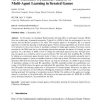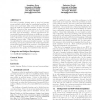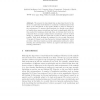1047 search results - page 36 / 210 » Learning the required number of agents for complex tasks |
EGPGV
2004
Springer
14 years 1 months ago
2004
Springer
This paper investigates assignment strategies (load balancing algorithms) for process farms which solve the problem of online placement of a constant number of independent tasks w...
ICML
2003
IEEE
14 years 29 days ago
2003
IEEE
Reinforcement learning has been used for training game playing agents. The value function for a complex game must be approximated with a continuous function because the number of ...
AAMAS
2006
Springer
13 years 7 months ago
2006
Springer
In this paper, we investigate Reinforcement learning (RL) in multi-agent systems (MAS) from an evolutionary dynamical perspective. Typical for a MAS is that the environment is not ...
ATAL
2009
Springer
14 years 2 months ago
2009
Springer
The field of transfer learning aims to speed up learning across multiple related tasks by transferring knowledge between source and target tasks. Past work has shown that when th...
DAGSTUHL
2003
13 years 9 months ago
2003
We present the hypothesis that an important factor for the choice of a particular embodiment for a natural or artificial agent is the effect of the embodiment on the agent’s ab...




